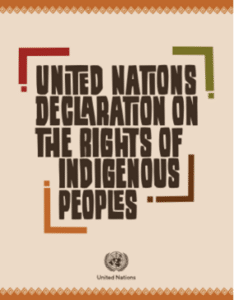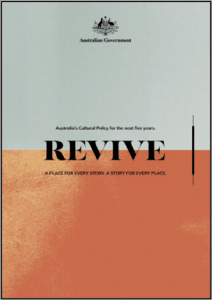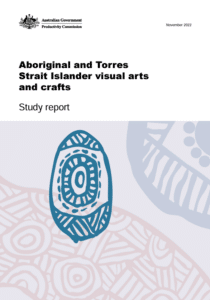For First Nations peoples, culture encompasses a connection to the world, the land, sky, and sea, interactions with community, language, and a history of survival and interconnectedness. Today, First Nations communities continue to revitalise and reclaim their cultural inheritances, asserting their rights to own and control their culture.
First Nations culture is increasingly sought after in various industries—arts, fashion, tourism, film, education, environmental management, and more. Protecting Indigenous Cultural and Intellectual Property (ICIP) ensures the use of their culture in industry is done with integrity.
Indigenous Cultural and Intellectual Property
The term Indigenous Cultural and Intellectual Property, or ICIP, refers to the rights that First Nations peoples have in relation to all aspects of their cultural heritage, including, but not limited to:
- Traditional Knowledge relating to science, agriculture, ecology, and rituals;
- Traditional Cultural Expressions e.g. stories, designs and symbols, literature, ceremonies, dance and song;
- Cultural property e.g. arts, crafts, ceramics, jewellery, weapons, tools, visual arts, photographs, textiles, or contemporary art;
- Documentation of Indigenous peoples’ heritage e.g. life experiences, perspectives, and priorities for their communities and Country in all forms of media such as films, photographs, written and digital materials and records, sound recordings, and research;
- Immovable cultural property e.g. secret and secret/historically significant sites and burial grounds; and
- Indigenous ancestral remains e.g. DNA and genomes.
ICIP is linked to people, land and identity, and is communally-owned by the group it belongs to. First Nations cultures are not fixed––they are constantly evolving. This means that the nature of ICIP may also evolve.
Recognition of Indigenous Cultural and Intellectual Property
First Nations peoples have been calling for recognition of their rights to manage and make decisions about their cultural heritage, knowledge and cultural expression. Recognising these rights empowers First Nations peoples to nurture strong cultural practices, sustain future generations and build cultural and economic wealth.

ICIP rights are enshrined in the United Nations Declaration on the Rights of Indigenous Peoples (UNDRIP).
Article 31 states that:
“Indigenous peoples have the right to maintain, control, protect and develop their cultural heritage, traditional knowledge and traditional cultural expressions, as well as the manifestations of their sciences, technologies and cultures, including human and genetic resources, seeds, medicines, knowledge of the properties of fauna and flora, oral traditions, literatures, designs, sports and traditional games and visual and performing arts”

UNDRIP, while a benchmark for international standards, is not legally binding in Australia until it is ratified as a treaty in Australia. There are laws in Australia that protect Intellectual Property generally, such as copyright, trade marks, confidential information, designs, patents and trade secrets, but these laws have limitations. There are no specific laws which specifically protect ICIP in Australia.
In 2017, Terri Janke and Company published a paper titled Indigenous Knowledge: Issues for protection and management that identified and unpacked the key issues in protecting ICIP in Australia. This included the appropriation of Indigenous art and the misuse of ICIP.

After many years of advocacy by First Nations peoples, the Australian Government has committed to introduce new stand-alone legislation to protect ICIP as agreed upon in the 2023 National Cultural Policy. This law will seek to address the gap within Australia’s current legal frameworks that fail to adequately protect ICIP rights.
Other key reports illustrating this move include the IP Australia and Ninti One: Interim Report on stand-alone legislation for Indigenous Knowledge (IK) (2022), and the Productivity Commission Study Report on Aboriginal and Torres Strait Islander visual arts and crafts (2022). The IP Australia and Ninti One Interim Report recommended a new ICIP law that would support First Nations peoples to protect and commercialise their ICIP. The Productivity Commission Study Report recommended a law to give First Nations peoples greater control over how their cultural assets are used in visual arts and crafts, and a mandatory disclosure for Indigenous-style products that are not made or licensed by a First Nations artist.
Protecting ICIP outside of the law
In the absence of laws, contracts and protocols which bind parties to an arrangement, have become a strategy for protecting rights. Contracts can recognise and protect ICIP through the inclusion of ICIP clauses. Protocols have become the leading industry practice for successful First Nations engagement. They go beyond the law to respect First Nations peoples’ rights and cultural differences and encourage ethical conduct and promote interaction based on good faith and mutual respect.
After years of working in ICIP, I developed the True Tracks® Principles. These principles are a flexible framework that can be widely applied to guide the use of ICIP, particularly when engaging First Nations peoples and communities. The True Tracks® Principles have been used as the foundation of tailored protocols for Aboriginal Land Councils, universities, government agencies and statutory bodies, libraries, museums, archives, researchers, social scientists, arts organisations, filmmakers, and First Nations and non-First Nations businesses. It is adaptable to different kinds of projects and collaborations.
If you are interested in knowing more about ICIP and how you can protect and manage it in your practices, get in touch with Terri Janke and Company at tjc@terrijanke.com.au to start the conversation.
To learn more about how your organisation can engage respectfully and ethically, members can watch a recording of DCA’s First Nations Cultural and Intellectual Property event, featuring Dr Terri Janke via the event page.
 Dr Terri Janke is a Wuthathi, Yadhaigana and Meriam woman, and an international authority on Indigenous Cultural and Intellectual Property (ICIP). She is known for innovating pathways for collaboration using Indigenous knowledge and cultural expression. As the owner and Solicitor Director of Terri Janke and Company, Terri advises on legal matters including intellectual property, business law, shareholder agreements and governance of Indigenous organisations. She has written leading ICIP Protocols and models for various sectors including the arts, museums, archives, film, and business. She has devised the unique True Tracks® Principles, a 10-step best practice framework for Indigenous engagement that continues to inform the processes of many government agencies and businesses. Recently, Dr. Janke assisted Ambassador for First Nations People Justin Mohamed in representing Australia for the World Intellectual Property’s Diplomatic Conference on Intellectual Property, Genetic Resources, and Associated Traditional Knowledges.
Dr Terri Janke is a Wuthathi, Yadhaigana and Meriam woman, and an international authority on Indigenous Cultural and Intellectual Property (ICIP). She is known for innovating pathways for collaboration using Indigenous knowledge and cultural expression. As the owner and Solicitor Director of Terri Janke and Company, Terri advises on legal matters including intellectual property, business law, shareholder agreements and governance of Indigenous organisations. She has written leading ICIP Protocols and models for various sectors including the arts, museums, archives, film, and business. She has devised the unique True Tracks® Principles, a 10-step best practice framework for Indigenous engagement that continues to inform the processes of many government agencies and businesses. Recently, Dr. Janke assisted Ambassador for First Nations People Justin Mohamed in representing Australia for the World Intellectual Property’s Diplomatic Conference on Intellectual Property, Genetic Resources, and Associated Traditional Knowledges.
